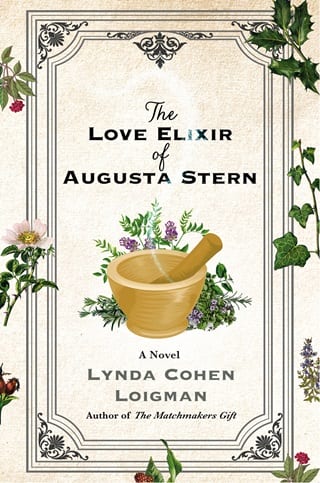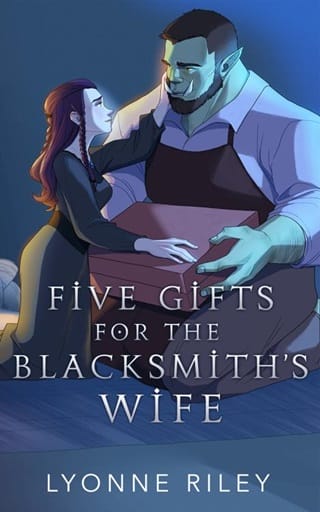Chapter Ten
TEN
DECEMBER 1922
That night, Augusta tossed and turned in her sleep. At three in the morning, she woke with a start from an awful nightmare that she couldn’t remember. She tried to slow her breathing by silently reciting the elements from the periodic table. When her muscles relaxed, she went to the kitchen for a glass of water.
She was surprised to find Esther there, working by candlelight, rummaging through a wooden apothecary case that she had set out on the table. As Augusta got closer, she saw that the case was a remarkable contraption: Over a foot high and a foot wide, it opened almost like a miniature wardrobe. Inside the doors were dozens of shelves and compartments, filled with stoppered glass bottles and square tins. Tiny knobs were screwed on to small drawers, filled with all kinds of herbs, leaves, and seeds.
Augusta watched as Esther opened a tin, pulled out a single raspberry leaf, and dropped it into the brass mortar. From a stoppered glass bottle, she chose what looked to be a piece of dried gingerroot and did the same. Over and over, she foraged in her case, until a small pile of items had been collected. A beam of moonlight shone in from the window, illuminating Esther’s long silver hair. Augusta rarely saw Esther without her headscarf, and the vision was almost otherworldly. Wrapped over her plain white nightdress was a robe Augusta did not recognize. It was long and silky, a deep sapphire blue, unlike anything she’d seen her aunt wear before. There was a haunting and powerful beauty about the woman that Augusta had previously failed to notice.
When Augusta first walked into the room, Esther seemed neither surprised nor startled. She placed a single finger over her lips in a motion that signaled absolute silence. Then she gestured to one of the kitchen chairs for Augusta to take a seat. The air in the room crackled with expectancy.
Esther’s brass mortar and pestle sat in the center of the table. As she worked, she murmured the softest of songs. Augusta did not recognize the Yiddish words, but she felt the full force of them deep in her chest. She forgot about her nightmare. She forgot about the glass of water she’d come for. She forgot about everything but Esther’s words and the rhythm of her voice.
A multitude of scents swirled around them—ginger and garlic, rosemary and yarrow, cinnamon and horehound, lemon and hyssop. There were other scents, too, for things she could not think to name. Augusta shut her eyes, and when she opened them, the scents in the room shifted yet again, smelling now of solace, of something wholesome and strong. A vision of Irving—healthy once more—filled her mind, as if Esther had conjured it out of the moonlight.
Esther emptied the contents of the mortar onto a waiting square of plain white muslin. The powder on the fabric sparkled like sunshine reflecting off a pile of freshly fallen snow. It shimmered like the wings of a firefly on a hot summer night. As Esther tied the pouch shut with a piece of string, Augusta swore she could see the light melt away.
Once Esther was finished, she blew out the candles and pulled her hair back up into her scarf. The silver patch of moonlight in the kitchen dulled to gray. The electric charge that had filled the room sputtered out.
Augusta felt as if she had been swimming underwater and had suddenly come to the surface for air. She took a deep breath and pointed to the bundle. “What is that for?”
Tilting her head this way and that, Esther weighed what and how much to say. “For the soup,” she finally answered. “The soup for your friend, the delivery boy.”
“I’ve seen you make dozens of batches of soup. You’ve never gone to all this trouble before.”
“That’s true,” said Esther, taking a seat. “But this boy is your special friend, yes? For him, I will make a special batch.”
When tears welled in the corners of Augusta’s eyes, Aunt Esther patted her niece’s hand. “Save your tears, Goldie,” she said. “In the morning, I will go to the butcher and get the best chicken in the store. I will make my soup—only the broth—and I will add my special herbs. Then when you come home from school, we will take the soup to your friend.”
“And you think that the soup will make Irving better?”
“It will.” Esther spoke with a quiet confidence, but she refused to say anything more.
“Aunt Esther, what were the words you were chanting? Were they the words that are carved into your mortar? The ones in the center of the bowl?”
Aunt Esther shrugged. “We’ll talk about it another time. It’s late and you should be in bed.”
In school, Augusta couldn’t concentrate on a single word her teachers said. She rushed home after class to find Esther by the stove, humming over a pot of soup. The room smelled of dill and garlic and broth and the fainter scents of the evening before. Augusta watched as her aunt ladled the soup into a clean clear-glass jar. Before she screwed on the lid, Esther pulled the muslin pouch from her apron pocket, untied the string, and sprinkled the herbs into the steaming liquid. She mumbled some words only she could hear. “Now, let us go to your friend,” she said.
Augusta had a thousand questions, but she didn’t want to delay their departure, so she decided to keep them to herself. They walked the two blocks to Irving’s building, climbed the narrow, dimly lit stairs, and knocked on Mrs. Rivkin’s door.
Irving’s mother looked as if she had been crying—her eyes were swollen bloodshot hollows, her lips a dry and mottled pink.
“Mrs. Rivkin, this is my great-aunt Esther. We’ve brought some of her soup for Irving.”
Mrs. Rivkin blinked back tears. “It’s kind of you both to come,” she said. “But he hasn’t been able to keep anything down.” She held her hands out for the jar. “You can leave that with me, and I’ll try to give him some of it later.”
Aunt Esther had no time for niceties. “He must have the soup now,” she said brusquely. “Where is the boy? I will give it to him.”
Even in her exhausted state, Mrs. Rivkin was taken aback. She was used to the soft-spoken Dr. Birnbaum, and to Solomon Stern’s reassuring ways. “But Irving is sleeping now,” she said. “I’m sure a bowl of soup can wait.”
“No,” said Esther. “He must eat it now.”
Augusta stepped in to explain. “She means that Irving should have the soup while it’s hot. She took it off the stove right before we came. I’m sure we can get him to have a spoonful or two. Please, Mrs. Rivkin? Will you let us try?”
Mrs. Rivkin twisted the corners of her apron in her hands. “Yes,” she finally said, relenting. She nodded to Esther. “Augusta can show you into the bedroom. I’ll get you a spoon from the kitchen.”
Augusta led her aunt into the bedroom, where the air was dark and slightly fetid. Irving lay under a heap of blankets so that only his face and one arm were visible—both thinner and paler than they should have been. Immediately, Esther pulled up the window shades to let in some of the afternoon light. She rested the jar of soup on the nightstand and used both hands to push open the windows. Then she peeled back a layer of blankets so that Irving’s neck and chest were exposed. As a blast of icy air filled the room, Irving began to stir.
Esther sat on the edge of his bed and took one of his hands in both of hers. She rubbed it as if it were a twig in the forest, as if she were trying to summon a flame. “Wake up, tateleh, ” she said. “I brought you something good to eat. Remember when you came for dinner?” A short laugh bubbled up from her throat. “I never saw someone so skinny eat so much.” She laid his hand gently on top of the blanket and patted it. “You’ll be back for dinner soon, I think.”
Mrs. Rivkin returned with the spoon and frowned. “Why are the windows open?” she said. “He still has a fever; he’s going to freeze!”
Esther took the spoon from Mrs. Rivkin. “The fresh air is good for him,” she said. “It will wake him up. I will shut the windows after he eats the soup.”
Mrs. Rivkin’s frown turned to a grimace. “I told you, he can’t keep anything down. I couldn’t even get him to take a sip of tea—”
But Esther was no longer listening. As she hummed the tune from the night before she motioned to her niece to help move some pillows so that Irving’s head was better supported. “Sit up, tateleh, ” Esther said. “There we go, very good.”
Carefully, Esther twisted the lid to open the jar of still-warm soup. Tiny green specks sparkled in golden liquid like flakes of glitter inside a snow globe. Esther held the jar closer to Irving to tempt him with the savory smell. As his nostrils began to twitch, Augusta thought she saw his eyelids flutter. He parted his chapped and colorless lips the tiniest fraction of an inch.
“Taste this now,” Esther whispered, gently spooning the soup into his mouth.
Augusta had hoped that Irving might eat one or two spoonfuls of the broth. She thought that after the first or second, her friend would most likely fall back asleep. But instead of rejecting the offering, Irving opened his mouth wider. Both Augusta and Mrs. Rivkin watched in amazement as, spoonful by spoonful, he consumed half the jar. He did so without once opening his eyes, without speaking or uttering a sound. After he had taken his fill, he nestled his head back against the pillow. The expression on his face was peaceful, like a satisfied infant, half intoxicated from the abundance of his mother’s milk.
“I can’t believe it,” Mrs. Rivkin murmured.
Esther nodded at her and smiled. She sealed the lid back onto the jar. “Take this,” she said, passing it to Irving’s mother. “Give the rest of it to him when he wakes.”
Dr. Birnbaum stopped by the next morning, before Augusta left for school. Bess ushered him into the kitchen, where the rest of the family was having breakfast. The sight of him sent Augusta’s heart sinking. Why was he visiting them so early? Was Irving worse?
“Good news!” the doctor said, smiling broadly as he dropped his black bag onto the floor. “The Rivkin boy’s fever broke last night. I called on his mother this morning, and he was already up and alert. Only the faintest hint of a cough.”
Augusta’s father put down his newspaper. “That’s wonderful,” he said. “Come and sit. Would you like to have some breakfast?”
Augusta leapt up from her chair and poured the doctor a cup of coffee. “What happened?” she asked.
“What do you mean? He’s a healthy young man—almost the same age as my Nathaniel. Irving got better, that’s all.” Dr. Birnbaum answered her inquiry with a dismissive wave of his hand.
“But Papa said it was very serious. None of the medicines were working.”
The doctor took a sip of coffee. “That is true,” he admitted. “But influenza is an unpredictable illness. We don’t know enough about the virus to say why some people recover and some don’t.”
“Esther and I brought him soup yesterday. Did Irving’s mother tell you that?”
“She did, yes. That was very kind.”
“Do you think the soup could have helped? Esther added some special herbs…”
Her aunt gave Augusta a warning glance while Solomon Stern looked up from his paper. When he turned his head to stare at Esther, she busied herself making a plate of toast.
“A little garlic and dill,” she clarified. “For flavor only.” She passed the doctor the plate and pushed a jar of preserves across the table.
“Thank you,” said the doctor, slathering his toast with the homemade sweet-smelling jam. “There’s nothing magical about soup, Augusta. The illness simply ran its course.”
“Dr. Birnbaum is right,” said Esther, her voice as firm as unripe fruit. “Soup is only soup.”
 Fullepub
Fullepub 



